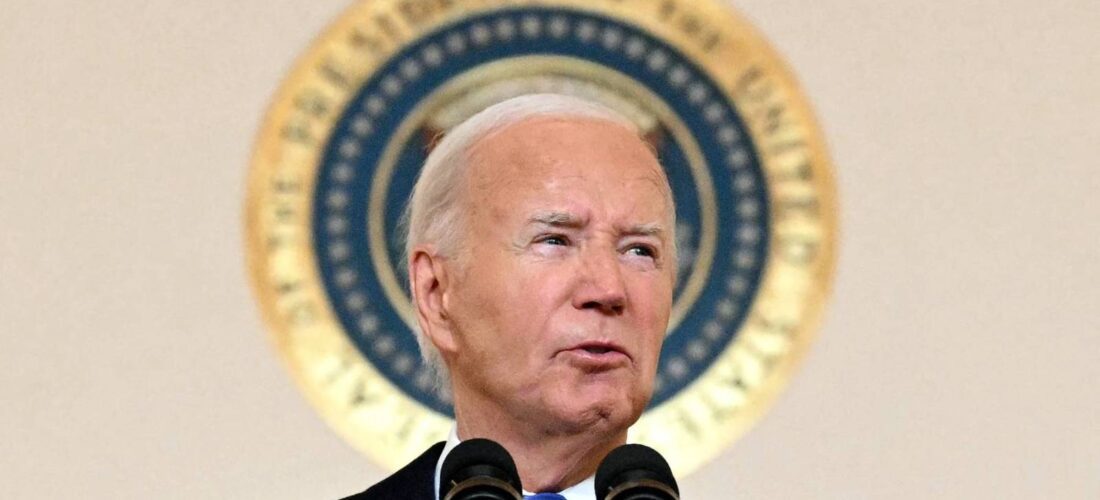Joe Biden Briefly Criticizes Supreme Court Immunity Ruling
On Monday evening, President Joe Biden addressed the Supreme Court’s decision on presidential immunity, speaking to the public for a total of four minutes and promptly leaving without taking any questions. The brief speech arrives days after a disastrous debate with Donald Trump left many Democratic lawmakers and Biden allies on Capitol Hill scrambling for ways to dump their presidential candidate.
“Today’s decision almost certainly means that there are virtually no limits on what the president can do,” said Biden, speaking from the White House. “It’s a dangerous precedent because the power of the office will no longer be constrained by the law, even including the Supreme Court of the United States. The only limits will be self-imposed by the president alone.”
“Now, the American people will have to do what the court should have been willing to do but will not: The American people have to render a judgment about Donald Trump’s behavior,” Biden added. “The American people must decide whether Donald Trump’s assault on our democracy on Jan. 6 makes him unfit for public office, the highest office in the land.”
“The American people must decide if Trump’s embrace of violence to preserve his power is acceptable,” he continued. “Perhaps most importantly, the American people must decide they want to entrust the presidency to Donald Trump, once again, now knowing he’ll be more emboldened to do whatever he pleases, whenever he wants to do it.”
Biden did not stay to answer questions from reporters — and did little to quell concerns about his health or his ability to bring the fight to Trump and the Supreme Court’s conservative supermajority, which Trump assembled as president. Biden did not indicate any plans to challenge, rein in, or reform the nation’s highest court; his campaign brushed aside a question from Rolling Stone on Monday about whether Biden has recalibrated his position on court reform in the wake of its immunity decision.
The Supreme Court ruled Monday that presidents have “absolute” immunity from prosecution for official acts committed while in office, but not for unofficial acts. In the 6-3 decision, the court ruled that “the nature of presidential power entitles a former president to absolute immunity from criminal prosecution for actions within his conclusive and preclusive constitutional authority. And he is entitled to at least presumptive immunity from prosecution for all his official acts. There is no immunity for unofficial acts.”
The decision effectively guarantees the Justice Department’s ongoing election interference case against Trump will not go to trial before the election in November.
Chief Justice John Roberts, who authored the majority opinion, wrote, “Without immunity, such types of prosecutions of ex-Presidents could quickly become routine,” adding, “The enfeebling of the presidency and our government that would result from such a cycle of factional strife is exactly what the Framers intended to avoid.”
The case will be sent back to the lower court in Washington to determine which alleged acts in Trump’s indictment are official or unofficial.
The six conservative justices — Roberts, Neil Gorsuch, Clarence Thomas, Samuel Alito, Brett Kavanaugh, and Amy Coney Barrett — were in the majority, while all three liberal members — Sonia Sotomayor, Elena Kagan, and Ketanji Brown Jackson — dissented.
“The president of the United States is the most powerful person in the country, and possibly the world,” Sotomayor wrote in her dissent. “When he uses his official powers in any way, under the majority’s reasoning, he now will be insulated from criminal prosecution. Orders the Navy’s Seal Team 6 to assassinate a political rival? Immune. Organizes a military coup to hold onto power? Immune. Takes a bribe in exchange for a pardon? Immune. Immune, immune, immune.”
As he ended his speech, Biden quoted Sotomayor’s dissent: “I concur with Justice Sotomayor’s dissent today. She said, ‘In every use of official power, the president is now a king above the law … With fear for our democracy, I dissent.’”
“So should the American people dissent — I dissent,” said Biden. As he walked off, he ignored questions from journalists, including one who asked if he would drop out of the race.
